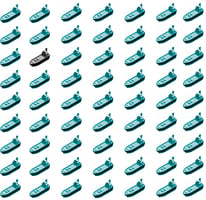PRESS RELEASE / FOR IMMEDIATE RELEASE Shipergy Ltd Announces Webinar "eMission: Impossible - CII...
Dire Straits ?
It cannot have escaped your notice that there are strange and worrying things afoot in the Bab-el-Mandeb and Arabian Gulf.
Amongst the miserable furore in Gaza, you might have missed the news that the US Navy destroyers USS Carney and USS Mason have been intercepting missiles fired from Yemen, targeting Israel. Others have apparently been targeted at US installations and assets in the region and many dozens of others have been targeted at shipping in the region.
What we see now is an escalation from the large scale attacks on shipping we saw in World War Two, famously in the Battle Of The Atlantic and in other theatres. It is, in some ways, a micro to macro pivot really, moving from the aim of destroying the ships and their cargoes themselves to the disruption of trade overall. It has stopped being about ships but of money.
Iran and their Houthi representation in Yemen are taking advantage of their location astride two major global trade chokepoints. Whilst the stranglehold they can exert on global oil trades by targeting ships in the Gulf is diminished from 30 or 40 years ago as other areas have become more important oil producers as well, the Arabian Gulf is still the arterial conduit through which the strategic bulk of the world’s oil lifeblood flows through. The Red Sea is almost as important for global trade-at-large. The latter has become an extremely fraught place in recent weeks as the Houthis and their Iranian-backers seek to put pressure on Israel over recent events in Gaza.
Galaxy Leader, a Japanese-operated and British-owned car carrier was hijacked by heavily-armed and IRGC-trained Houthi militia fast-roping down from helicopters on the 19th of November. Central Park, a small Handy chemical tanker owned by Zodiac in London (which is ultimately controlled by the Ofer Group) was attacked in the same way last week but the Houthis were unable to complete the hijacking as the US Navy responded with a quick reaction force and the Houthis broke off and fled. Sadly, the crew of the Galaxy Leader and their ship and cargo remain hostages of the Houthis as of the time of writing. 
In the first week of December, three vessels, Sophie II (a Japanese-owned 2020 built Kamsarmax bulker) Number 9 (a German-owned/managed 4250 TEU box ship) and Unity Explorer (an IOM-owned Panamax bulker from 2016) sustained “light damage”. Over a dozen vessels have been attacked since then, including the Ardmore-owned MR2 Ardmore Encounter and the boxship Maersk Gibraltar, prompting Maersk to issue a statement saying:
“The recent attacks on commercial vessels in the Bab al-Mandab Strait are extremely concerning. The current situation puts seafarer lives at risk and is unsustainable for global trade. As it cannot be solved by the global shipping industry on its own, we call on political action to ensure a swift de-escalation.”
Maersk this Friday ceased Red Sea transits for its operations and it is fair to expect other lines will follow suit quickly.
Arch-competitor MSC denied Houthi reports this week two of its vessels, MSC Alanya and MSC Palatium III were hit by missiles though reports from maritime security firms we have seen seem to suggest both were directly threatened.
At least five more merchant vessels were attacked or sustained hits from Houthi missiles this week. Strinda, a Norwegian flagged Handytanker from 2006 owned by Ludwig Mowinckels Reederi was left aflame after being hit by a drone and the post-Panamax Hapag-Lloyd container vessel Al Jasrah was also hit and lost some containers over the side according to reports we have seen. Late on Friday reports emerged of another attempt to board and hijack yet another vessel in the Bab-el-Mandeb Straits.
Through its social media mouthpieces, the Houthis and their IRGC backers asserted that all these vessels were attacked because of supposed links to Israel, through notional shareholdings in their owning companies.
This December has seen for the first time short and intermediate range ballistic missiles being used against merchant shipping. These are an order of magnitude more difficult to shoot down by the US destroyers shepherding the flocks off Yemen. Between these, the drone attacks and the threat of armed hijacking the Houthi triple threat is very real and It must be a tense time indeed for seafarers transiting this region.
Some observers have suggested that the Houthis may be trying to resurrect Somali piracy attacks again by providing weapons, fast boats and financial inducements for those willing, which would also have very significant consequences for shipping if this does indeed come to pass.
So, what does this mean for us?
We all know that the oil markets are always worried when shipping starts getting attacked in and around that region and this does historically spook prices upward when attacks like this take place. The importance of the hijacking of the Galaxy Leader cannot be overstated though, as the ship, her crew and her cargo were taken in broad daylight by a brazen paramilitary force in international waters. The potential P&I claims for this and the damage to the vessels that were hit by drones are naturally going to be significant and this will mean higher premiums for everyone in 2024. That will mean higher opex costs and more shipping companies struggling in a period of dreadful rates in some sectors. The container sector in particular looks set to have an awful 2024 and this will not help at all. Maersk’s seismic decision not to transit the Red Sea any longer will have huge knock-on impacts for the other lines and may well impact logistics chains in the run up to Christmas in Europe.
The tonne/mile impact on tanker rates are difficult to plot as of now, but a possible attack on a tanker vessel resulting in its loss, or that of its crew as we came within a whisker of seeing with the ill-fated Strinda, would be somewhat easier to pin down in terms of market effects.
It is interesting to note that the US Navy has on Friday announced that it, along with the UK and France are putting together a flotilla (aside from the Task Force 153 which is already involved in patrolling the area and protecting shipping) of very high end air defence frigates and destroyers, (pointedly, many with a very specific land attack cruise missile capability) together to patrol the Bab-el-Mandeb straits and Red Sea. These are not tasked to escort merchant vessels as there are several hundred passing through in both directions daily and there are simply too many to escort effectively, but to provide area air defence against air attack by missiles and drones. This is very much a “watch this space” move as we cannot be far away now from the point where the Allied naval units are empowered under revised RoEs to strike back against the land-based launchers and infrastructure from where these attacks are coming from.
It gets a lot more serious from there, once that line is crossed.
We try not to think of the ramifications of Israel or the US losing patience and attacking Iran directly, but that country’s nuclear arms programme and increasingly bellicose actions in the Gulf via their Yemeni proxies must surely mean that this eventuality is likely edging closer by the day. It is well-known that were a real kinetic shooting war to kick off in earnest, Iran is likely to immediately close the Hormuz Straits with thousands of sea mines of various types dropped by sea, air and submarine, and target US and friendly naval assets in the region with their vast drone fleet, submarines, missiles and armed speedboats. We could likely expect something similar but on a smaller scale from the Houthis for the Bab-el-Mandeb and Red Sea as well if it came to that.
It would be nothing less than a catastrophe for shipping.
Oil prices would shock upwards to near-unprecedented levels, container movements into the Gulf region would be pretty much ceased and the world economy would be thrown into turmoil. Container trades into the Indian subcontinent and indeed on the vast scale EU-Asia-EU shuttles would be disrupted as we have already seen, and will have to start using the Cape transit as the approaches to the Suez from the Bab-el-Mandeb would be too hazardous, meaning the P&I Clubs might require special supplementary war risk cover for it.
South Africa and the surrounding bunkering ports may not have the supply available to service the trades that were previously going north through the Suez Canal and bunkers would be a massive issue for shipping companies seeking to take the Cape routes. Consumption would sky-rocket right as the fuel price does likewise as we would see an abrupt end to slow steaming from the box majors. Then, in what is already a period of poor container rates, could all the box players soak up this impact onto their opex calculations?
This credit manager would contend: probably not if it went on for months on end.
Where that leaves us then is a very dark place indeed for container shipping and global trade. It would likely take a few costly, grinding months to clear the mines and wrecks away sufficient to clear safe operating lanes once the fighting comes to an end and none of us really know what economic damage could be done in the meantime. It wouldn't be good for anyone.
With so much evil and darkness happening in the world lately it is easy to lose track of what might be just around the corner but the signs in the Gulf region are not good for anyone. The hope is that common sense prevails, that the Iranians and their proxies choose to or are forced to back down and that the Gulf states and their allies are able to ensure the worst does not happen. Hope is all we have, really.
I hope the reader will forgive one last paragraph in what is already a very lengthy write-up of a hugely complicated topic. I think it is vital that this is pointed out: that the vigilant and tireless work the US Navy and other friendly navies have been doing in safeguarding shipping in the region lately and for many years has been woefully under-acknowledged. It has been, and remains, something to marvel at and be proud of. They have done a superb job and we should all be thankful for the efforts their brave men and women are doing, putting themselves in harm’s way to protect ships and their innocent crews just going about their business in keeping the world’s trade ticking over.
We owe them all a debt of gratitude, for now, and for what may be to come.




